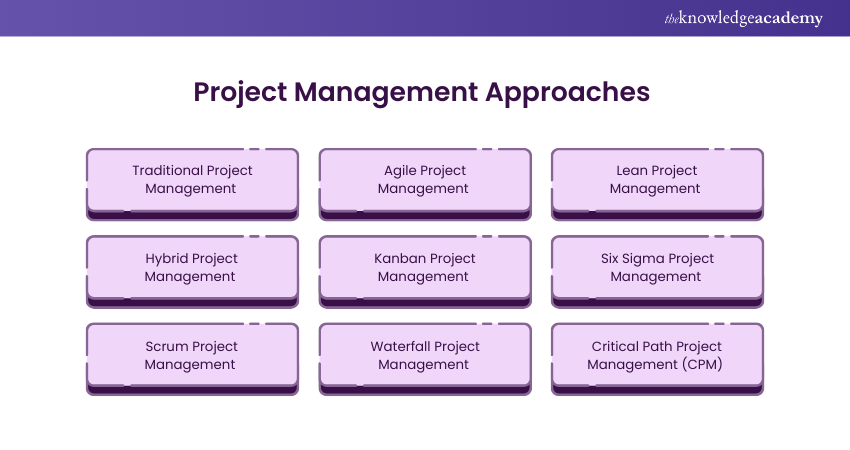We may not have the course you’re looking for. If you enquire or give us a call on +971 8000311193 and speak to our training experts, we may still be able to help with your training requirements.
Training Outcomes Within Your Budget!
We ensure quality, budget-alignment, and timely delivery by our expert instructors.

Project Management involves managing, organising, and Planning resources to achieve specific goals within a set timeframe. It requires handling tasks in an organised way, ensuring that objectives are met efficiently. From managing team size and roles to implementing Effective Communication strategies, Project Management adapts to the needs of each project.
Are you ready to lead teams and drive projects to success, meeting business goals on time? A Career in Project Management might be the perfect fit for you. If you're new to this exciting field, don't worry. We're here to guide you step by step through the basics of Project Management. You'll learn What is Project Management and why it can be a great and rewarding career choice.
Curious to learn more? Read this blog to explore how Project Management can enhance your career and help you lead projects successfully.
Table of Contents
1) What is Project Management?
2) What is a Project?
3) Why do we use Project Management?
4) Project Management Approaches
5) Different Stages of Project Management
6) Example of Project Management
7) Conclusion
What is Project Management?
Project Management involves applying processes, methods, skills, knowledge, and experience to achieve specific project objectives within set parameters. It has final deliverables with a finite timescale and budget.
What sets Project Management apart from general management is its focus on a final deliverable and a defined timespan, unlike ongoing management. Therefore, a Project Manager needs a variety of skills, including technical skills, people management, and business awareness.
What is a Project?
A project is a unique and temporary effort to achieve planned goals, which can be defined in terms of outputs, outcomes, or benefits. A project is considered successful if it meets its objectives within the agreed timescale and budget. Every project relies on three main elements:
a) Time: Scheduling Techniques are used to develop and present when work will be performed.
b) Cost: How necessary funds are acquired and finances managed.
c) Quality: How the fitness for the purpose of deliverables and management processes are ensured.
Why do we use Project Management?
We use Project Management to create an end product that brings positive change to an organisation. It involves initiating, planning, and controlling various tasks to achieve this goal. Projects that need formal management typically:
a) Produce something new or modified, whether tangible or intangible.
b) Have a clear start and end date.
c) Are complex in terms of tasks or teams involved.
d) Require managing changes.
e) Require managing risks.
Investing in effective Project Management offers several benefits:
a) Increases the chances of achieving the desired outcome.
b) Ensures efficient and optimal use of resources.
c) Meets the diverse needs of the project’s stakeholders.
Learn the basics of Project Management with our Project Management Certification – Register today!
Project Management Approaches
Project Management Methods offer structured approaches to handling and completing project activities efficiently. These methods help organise work, reduce complexities, save costs, and minimise risks. Below are some of the most common Project Management approaches:

1) Traditional Project Management
Traditional Project Management follows a structured approach, often based on the Project Management Body of Knowledge (PMBOK). This method focuses on key aspects like budgeting, managing inputs and outputs, and using a common framework of rules. PMBOK provides a detailed framework for essential processes such as planning, organising, executing, and controlling projects.
2) Agile Project Management
Agile is ideal for fast-paced, complex projects. It is flexible and adapts to changing requirements, using continuous planning and monitoring. Agile Project Management Techniques breaks project into small parts called iterations, allowing quick feedback from stakeholders after each cycle and ensuring ongoing improvement throughout the project.
3) Lean Project Management
Lean Project Management focuses on minimising waste and using only essential resources to maximise value for the customer. Similar to lean production principles, this method aims to deliver high-quality results while using minimal time and materials.
4) Hybrid Project Management
Hybrid combines elements of Agile and traditional Project Management. It allows teams to work autonomously in iterations while adhering to high-level plans with clear milestone targets. This approach is useful for teams that need the flexibility of Agile but also require traditional tracking tools like Gantt Charts.
5) Kanban Project Management
Kanban is a visual method that helps improve workflow and productivity. It uses a Kanban board to display tasks in stages such as "to do," "in progress," and "done." This visual representation allows teams to track progress, prioritise tasks, and spot bottlenecks, promoting efficiency and transparency.
6) Six Sigma Project Management
Six Sigma is a data-driven method that focuses on reducing defects and variability in processes. It follows the DMAIC process: Define, Measure, Analyse, Improve, and Control. This structured approach helps identify areas for improvement, implement solutions, and maintain enhanced performance through continuous monitoring.
7) Scrum Project Management
Scrum is an Agile framework that divides project work into short sprints lasting one to four weeks. Teams collaborate during daily stand-up meetings and review progress at the end of each sprint. Scrum focuses on delivering incremental value, with each sprint resulting in a potentially shippable product.
8) Waterfall Project Management
Waterfall is a linear, phase-based approach ideal for projects with clear, fixed requirements and less need for flexibility. Key stages include requirements gathering, design, implementation, testing, and deployment. This method provides structured control, allowing Project Managers to choose the best approach for successful Project Execution.
9) Critical Path Project Management (CPM)
CPM is a Project Management approach that identifies necessary tasks and focuses on the longest sequence of dependent tasks. It reduces project duration by highlighting critical tasks. Used first for a New York skyscraper, CPM is now applied in construction, software, and product development, simplifying complex projects.
Enhance your Project Management skills with our Waterfall Project Management Certification - Start your journey to success now!
Different Stages of Project Management
In Project Management, phases help improve project quality by reducing risks. Breaking the process into tasks based on time and complexity ensures timely delivery and higher quality. There are mainly five phases in Project Management:
Initiation:
The project begins with defining its vision, objectives, and feasibility.
Planning:
A project plan is created, tasks are sequenced, resources are allocated, and risks are identified.
Execution:
The project plan is implemented, tasks are completed, and quality standards are maintained.
Monitoring:
Project performance is tracked, deviations are corrected, and changes are managed.
Closing:
Final deliverables are handed over, administrative tasks are completed, and lessons are reviewed.
Learn risk identification and mitigation plans with our Project Management Certification - Get certified and lead with confidence!
Example of Project Management
A manager leads a team to build new software apps. They start by specifying the project’s size. Then, they classify team jobs and list developers, engineers, technical writers, and quality assurance specialists. The manager prepares a schedule and assigns deadlines to tasks.
Project Managers often use diagrams like Gantt or PERT charts to show progress. These tools help determine which tasks each office will complete. They also define a budget that is more than enough to handle unforeseen events.
The manager ensures the team has the resources to build, test, and deploy the software. They unify team members from different backgrounds and explain the project’s overall purpose. While managers may be technically skilled, their main role is to turn high-level visions into real, budgeted, and time-bound results.
Conclusion
Project Management is the process of applying specific skills, knowledge, and tools to effectively plan, execute, and oversee tasks to meet project goals. It ensures projects are delivered on time, within budget, and to the desired quality. Understanding What is Project Management is essential for efficiently managing resources and achieving successful outcomes in any industry.
Explore our courses on Project Management Courses - Sign up today to take your career forward.
Frequently Asked Questions

Project Management is the process of planning, organising, and overseeing tasks to achieve specific goals within a set timeframe and budget. It involves defining the project's scope, setting objectives, and managing resources to ensure successful completion.
Project Management aims to deliver a final product or service that meets the desired criteria. It ensures that the project stays on track, within budget, and meets quality standards. The Project Manager coordinates the efforts of the team, addresses challenges, and makes necessary adjustments to keep the project moving forward.

The 5 basics of Project Management are:
a) Project Initiation: Define the project, its purpose, and objectives.
b) Project Planning: Create a detailed plan with tasks, timelines, resources, and budgets.
c) Project Execution: Implement the plan, manage the team, and execute tasks.
d) Project Monitoring: Track progress, identify issues, and adjust as needed.
e) Project Closure: Complete the project, deliver the final product, and evaluate success.

The Knowledge Academy takes global learning to new heights, offering over 30,000 online courses across 490+ locations in 220 countries. This expansive reach ensures accessibility and convenience for learners worldwide.
Alongside our diverse Online Course Catalogue, encompassing 17 major categories, we go the extra mile by providing a plethora of free educational Online Resources like News updates, Blogs, videos, webinars, and interview questions. Tailoring learning experiences further, professionals can maximise value with customisable Course Bundles of TKA.

The Knowledge Academy’s Knowledge Pass, a prepaid voucher, adds another layer of flexibility, allowing course bookings over a 12-month period. Join us on a journey where education knows no bounds.

The Knowledge Academy offers various Project Management Courses, including Introduction to Project Management Course, Project Management Office (PMO) Fundamentals Course and Certified Digital Services Project Manager Course. These courses cater to different skill levels, providing comprehensive insights into Top 13 Project Management Trends.
Our Project Management Blogs covers a range of topics offering valuable resources, best practices, and industry insights. Whether you are a beginner or looking to advance your Business Improvement skills, The Knowledge Academy's diverse courses and informative blogs have you covered.
Upcoming Project Management Resources Batches & Dates
Date
 Introduction to Project Management Course
Introduction to Project Management Course
Thu 1st Jan 1970







 Top Rated Course
Top Rated Course



 If you wish to make any changes to your course, please
If you wish to make any changes to your course, please


